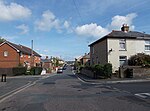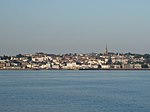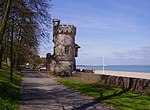Isle of Wight Bus & Coach Museum
Bus museums in EnglandMuseums established in 1997Museums on the Isle of WightTransport on the Isle of WightUse British English from February 2023
The Isle of Wight Bus & Coach Museum, also referred to as The Isle of Wight Bus Museum, was founded in 1997 in Newport on the Isle of Wight in the United Kingdom. The museum is a registered charity and run completely by volunteers. The vehicle collection is currently housed in the former bus depot at Ryde, Isle of Wight. The museum hosts two bus rallies of its own. There is one event in May, running day. and another in October which features many buses from around the country.
Excerpt from the Wikipedia article Isle of Wight Bus & Coach Museum (License: CC BY-SA 3.0, Authors).Isle of Wight Bus & Coach Museum
Park Road,
Geographical coordinates (GPS) Address Nearby Places Show on map
Geographical coordinates (GPS)
| Latitude | Longitude |
|---|---|
| N 50.726108 ° | E -1.154863 ° |
Address
Park Road 47
PO33 2HD , Oakfield
England, United Kingdom
Open on Google Maps










